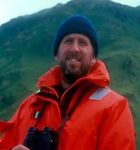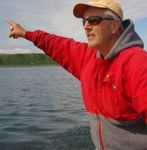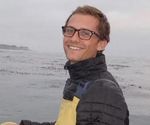2020 Virtual Sea Otter Science Symposium October 6, 7, 8, 2020
←
→
Page content transcription
If your browser does not render page correctly, please read the page content below
2020 Virtual Sea Otter Science Symposium
October 6, 7, 8, 2020
OUR SPEAKERS
James Estes Keynote, Tuesday October 6, 7 pm PDT
Dr. Jim Estes is an ecologist and Distinguished Professor at University of
California, Santa Cruz (UCSC), known for his studies of sea otters and kelp
forest ecology. He graduated from the University of Minnesota in 1967,
earned a Masters in Biology from Washington State University in 1969, and a
Ph.D. in biology and statistics from the University of Arizona in 1974. He
worked for the U.S. Fish and Wildlife Service and the U.S. Geological Survey
from 1974 to 2007 before joining the UCSC faculty. He was elected to the
National Academy of Sciences in 2014. Estes and his work are featured
prominently in the documentary film, The Serengeti Rules, which was released
in 2018. Jim has been the recipient of numerous awards and honors, including
the U.S. Geological Survey’s Schumaker Award for excellence in science
communication, the Western Society of Naturalists’ Lifetime Achievement
Award, and the American Society of Mammalogists’ C. Hart Merriam Award.
He is also a Pew Fellow in Marine Conservation, a Fellow of the California
Academy of Sciences, and a Member of the U.S. National Academy of Sciences.
He is the author of Serendipity: An Ecologist's Quest to Understand Nature
(2016).
Edward Gregr Wednesday October 7, 2:00 pm
Dr. Edward Gregr is an interdisciplinary research scientist and analyst with over
30 years of experience in the spatial analysis of marine systems. He is an
Adjunct Professor at the University of British Columbia Institute for Resources,
Environment, and Sustainability (since 2017),
http://ires.ubc.ca/person/edward-gregr/ and the principal of SciTech
Environmental Consulting (since 2002). With interests at the intersection of
oceanography, species distributions, and resource management, he has
published extensively on a variety of topics related to marine ecology and
systems science. He continues to provide scientific analyses to industry,
academic, and government partners on a variety of applications related to
species and their habitat.Scott Groth Tuesday, October 6, 1:00 pm
Scott Groth is a shellfish scientist for the Marine Resources Program in the
Oregon Department of Fish and Wildlife, based in Charleston, Oregon. He grew
up in upstate New York, worked on water quality issues in Lake Ontario, hiked
Appalachian trail, worked with fishermen as a biologist in Bering Sea Alaska,
and worked as a hydrographic surveyor for Army Corps of Engineers in Norfolk,
VA. He began his work at the ODFW as a biologist 1999-2001 has been in his
current position 2004. He manages Oregon’s pink shrimp fishery (first shrimp
fishery certified sustainable!), and sea urchin and abalone fisheries. He
oversees monitoring, research and management decisions for these fisheries.
He is a guide for mountain biking events, plays hockey, and has twin 16 year old
daughters.
Sara Hamilton Tuesday, October 6, 2:00 pm
Sara Hamilton is a Ph.D. student and NSF-GRFP fellow at Oregon State University.
She did her undergraduate degree in Biology and Gender Studies at Bowdoin
College in Maine. For her Ph.D. thesis, she takes an applied and interdisciplinary
approach to studying bull kelp forests in the Pacific Northwest, examining many
parts of the kelp forest systems including the spatial ecology of sea stars,
population dynamics of bull kelp, diets of purple urchins, and best practices in kelp
forest conservation. She works with partners such as the Nature Conservancy and
the Oregon Kelp Alliance to support kelp forest monitoring, science, and decision-
making. Since moving to Oregon in 2017, she has fallen in love with the state and
would like to acknowledge that she currently lives on the traditional lands of the
Tsankupi band of the Kalapuya peoples, who were forcibly removed from these
lands to reservations in the mid-1800s. Today many of the descendants of these
peoples are members of the Confederated Tribes of Grand Ronde Community of
Oregon and the Confederated Tribes of the Siletz Indians.
Brent Hughes Thursday, October 8, 1:00 pm
Dr. Brent Hughes is an Assistant Professor in Coastal Ecology and Conservation at
Sonoma State University who is generally interested in determining processes that
affect the stability of coastal ecosystems. Research in his lab centers around
coastal habitats – seagrass, salt marsh, and kelp (aka foundation species) – which
provide valuable ecosystem services, yet are threatened by human activities.
Currently research in the lab focuses on four themes: 1) the consequences of
predator recovery on the functioning and stability of ecosystems, 2) the relative
influence of climatic drivers and anthropogenic threats of coastal ecosystems, 3)
the role of foundation species in structuring nearshore diversity and
functioning and in turn the drivers maintaining foundation species stability, and 4)
informing management and restoration on the processes that drive ecosystem
resilience. . http://hughesecology.com/
Daniel Okamoto Wednesday, October 7, 1:00 pmDr. Daniel Okamoto is a professor and researcher in Department of Biological
Science at Florida State University. He received his PhD from University of
California Santa Barbara, a masters in Fisheries from the University of Alaska
Fairbanks, and undergraduate degree from the University of Washington. His
work focuses on nearshore ecosystems, including fish, invertebrates and algae,
from California to Alaska and many projects involve direct collaboration with
local communities. Core research locations include the oceans surrounding the
Great Bear Rainforest (British Columbia), the Gwaii Haanas National Marine
Conservation Area (British Columbia), southeast Alaska, and coastal California.
He is a participant in several large interdisciplinary collaborative groups such as
the Hakai Institute and the Global Impacts of Climate Change on Kelp Forest
Ecosystems working group at the National Center for Ecological Analysis and
Synthesis (NCEAS).
Josh Smith Tuesday, October, 6, 3:00 pm
Joshua Smith is a PhD Candidate and NSF Graduate Research Fellow at the
University of California, Santa Cruz. https://census.eeb.ucsc.edu/ His research
explores species interactions that shape the structure and organization of
marine communities. Specifically, he focuses on the conditions that determine
whether predators or resources drive population and community dynamics.
Josh has spent the last five years of his dissertation research studying these
concepts in kelp forests around Monterey Bay, California, where a large-scale
ecosystem shift recently transformed expansive kelp forests to a patchy mosaic
of forests interspersed with sea urchin 'barrens'. Josh's research leverages this
mosaic of ecosystem states as a natural field experiment to explore how sea
otter and sea urchin behavior underpin kelp forest resiliency.
https://www.joshuagsmith.com/dissertation
Tim Tinker Thursday, October 8, 2:00 pm
Dr. Tinker is a widely respected, extensively published senior marine ecologist.
He is Principal Research Ecologist with Nhydra Ecological Consulting, Halifax,
Nova Scotia and currently holds appointments at several universities in the US
and Canada. He has frequently participated as an expert advisor to the U.S.
Marine Mammal Commission, the US Fish and Wildlife Service, and the
Canadian Department of Fisheries and Oceans. He co-authored the ESA
Recovery Plan for the SW Alaska sea otter, and contributed to workshops
convened to Develop Population Viability Models for Marine Mammals and
Investigate Ecological Impacts of Killer Whale Predation in the North Pacific.Jaasaljuus Yakgujanaas Wednesday, October 7, 1:00 pm
Jaasaljuus Yakgujanaas earned a Bachelor of Science in Marine
Biology -- Hawaii Pacific University in 2017. Growing up on Haida
Gwaii helped foster her connection to the land and sea. She is
currently the Assistant Biologist for the Haida Fisheries Program
under the direction of the Council of the Haida Nation, working on
an array of projects including the 2018 Northeast Pacific
Seamount Expedition, underwater dive surveys with focus on
harvest species, and most recently the Chiixuu Tll iinasdll –
Nurturing Seafood to Grow. She is also a commercial SCUBA diver
and a certified PADI Divemaster.You can also read

























































